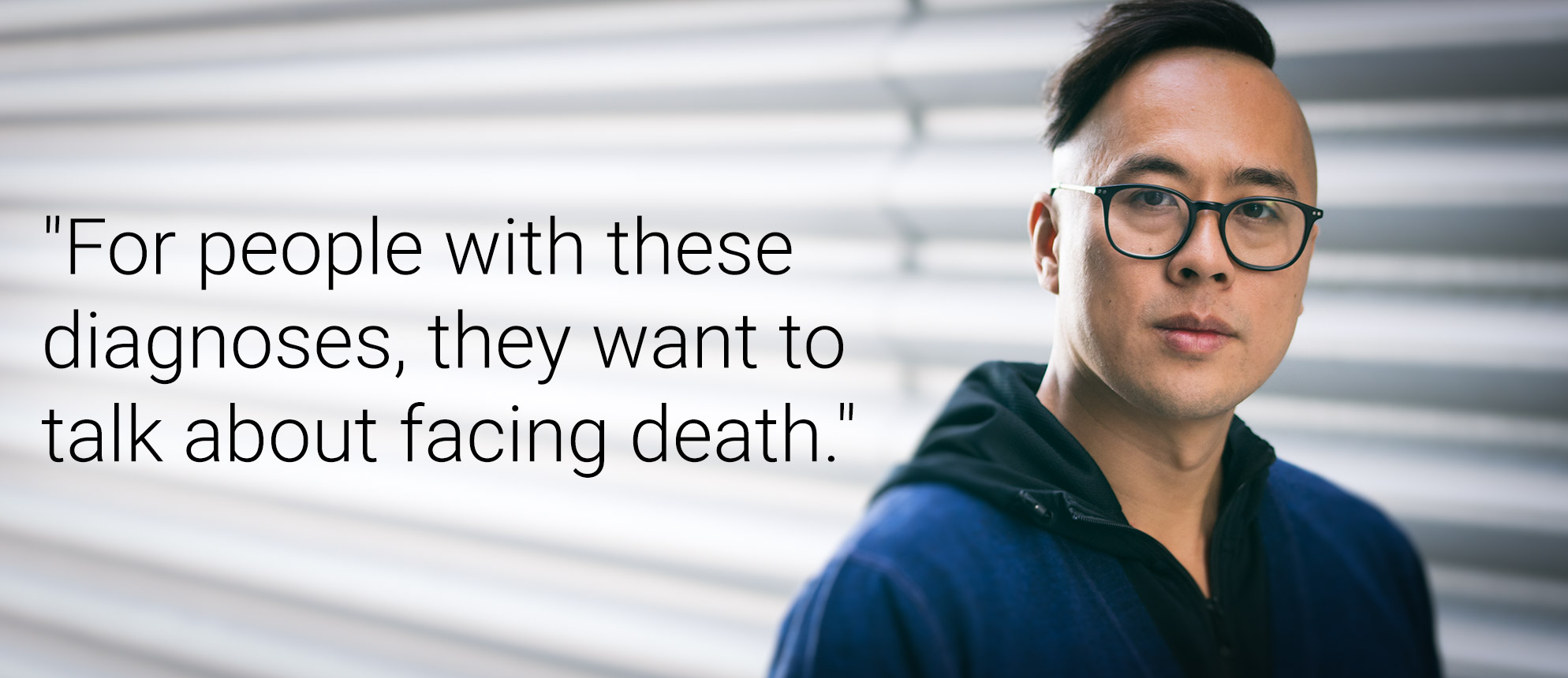- Future Students
- Current Students
- Faculty
- Staff
- Alumni
- Others
How to talk about life and death

A discussion about death with a loved one who has a terminal illness is a conversation we all hope never to have, and one that we all would probably prefer not to think about.
But ignoring matters of life and death doesn’t make them go away, and by avoiding the issue of how to talk about death, many of us are unprepared for such difficult discussions when they eventually become a sad reality.
Dr. Chris Lo, an instructor in the University of Guelph-Humber’s Psychology program, has found that many grieving family members or friends of terminally ill patients have great difficulty knowing how to best support their loved one. His Lecture Series talk on Feb. 15 helped to explain how we might want to approach those conversations differently than we might expect, as well as the complex emotional responses that accompany the arrival of an advanced, or fatal, illness.
“Oftentimes for people with these diagnoses, they want to talk about facing the end of life and facing death,” said Dr. Lo, who has worked for years studying patients dealing with advanced cancer. “It’s not easy, but many of them do want to talk about it because it’s something they’re wrestling with.
“For people trying to support these individuals, there is often the idea that they should steer away from this frightening topic if it arises and talk only optimistically: ‘it’s going to be fine’; ‘don’t think about it’; ‘it’ll be OK.’ Although the intention is good, in practice this can shut down a conversation. If a patient wants to share their worries, then from their point of view, it can seem like they have to bear these feelings on their own.”
Sometimes there is an underlying fear that by talking about something so horrible, we risk somehow making it real, or conversely that fostering positive thinking can help a patient to recover. At other times people may be afraid such conversations will upset their loved one by causing them to lose hope.
“In this context, the disease will progress at its pace” he says, “ and “although much can be done to plan for the future and to manage symptoms as they appear, the end of life is a difficult reality that has to be acknowledged. In situations of advanced disease, talking about death and dying doesn’t make it more likely to happen. But by not talking about it, families can’t prepare. And when mortality does occur, it can be so much more distressing.”
Psychosocial clinicians and researchers increasingly consider the diagnosis of advanced cancer as not only an individual disease but also a social situation that also affects those close to that person, and that there is much undisclosed suffering in this group. Beyond such tangible caregiving duties as cooking and cleaning, co-ordinating appointments and arranging for help in the event of an emergency, the loved ones of a terminally ill person also have their own feelings of grief that can be difficult to work through.
“These loved ones have as high, if not higher, rates of depression and distress as the actual patients,” Dr. Lo said. “Sometimes if you really want to help the patient, you also have to help their partner or family.”
Though the material Dr. Lo covers could be upsetting to some, it could also be viewed as inspirational from a different perspective.
“Ultimately we don’t talk about death and dying as its own end, rather it’s to better understand what it means to have life, and what it means to make the most of the time that we are given,” Dr. Lo said. “Those two concepts, of life and of death, are intrinsically tied. It’s not just a philosophical question, but a deeply practical one as well: When you have a year of life to live, what are you going to do? Inevitably, the answer will rest on what you feel is most important in your life, on who you are in the profoundest sense.”
Learn more about Psychology at the University of Guelph-Humber.

